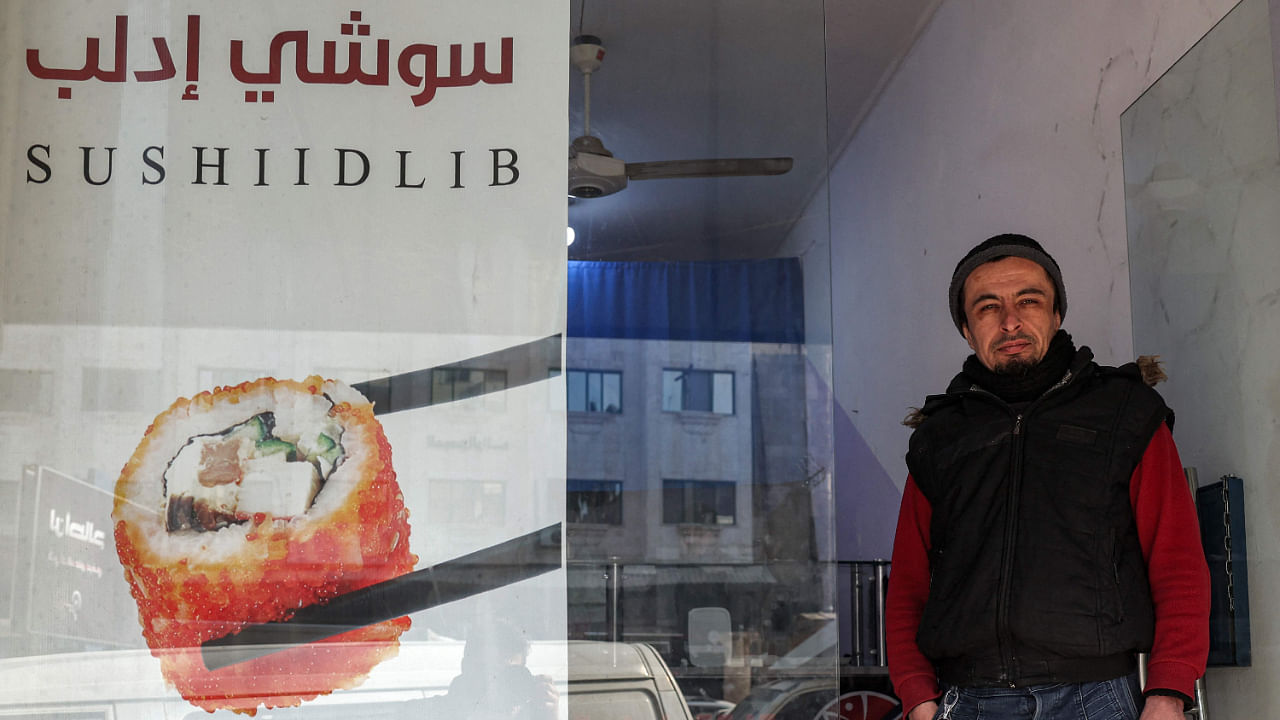
A Russian jihadist has traded his weapons for wasabi by opening a small sushi restaurant in war-torn Syria's rebel-held northwest, as the conflict wanes and fighters look for other income.
Islam Shakhbanov, 37, from Russia's Muslim-majority Dagestan republic, said he headed to Syria in 2015 "to take part in jihad".
But after years of war, the Damascus government has regained control of most of the country and Syria's main frontlines have largely frozen, putting many foreign fighters out of a job.
"In the end I opened this sushi restaurant," the goateed man told AFP, standing near a banner displaying a fish, with slogans in Arabic, English and Russian.
Wearing a warm vest, and with a dark winter cap on his head, Shakhbanov said he fought alongside jihadist factions and the Faylaq al-Sham rebel group until about five years ago.
Faylaq al-Sham is a Sunni Islamist group that has acted as Turkey's proxy during several Turkish military campaigns on Syrian soil. It has also been the source of pro-Ankara mercenaries sent to battle in Libya on the side of the UN-recognised government.
The group fought fierce battles against the Russian-backed Syrian regime in Aleppo, Idlib and Latakia provinces, and is considered close to the Syrian branch of the Muslim Brotherhood.
Shakhbanov said he had lived in countries including Pakistan, Afghanistan, Indonesia and Saudi Arabia, and was inspired to open "Sushi Idlib" after sampling Japanese cuisine during his travels.
He boasted it was the first sushi restaurant in the conservative enclave, Syria's last main rebel bastion where many people depend on humanitarian aid.
Rebel-held Idlib is home to about three million people, around half of them displaced by 12 years of war.
The enclave is controlled by Hayat Tahrir al-Sham, the former Syrian branch of Al-Qaeda, and other rebel groups -- some of whom count fighters from central Asia and the Caucasus among their ranks.
Landlocked Idlib is surrounded by regime troops to the south but borders Turkey to the north, with the coast less than 25 kilometres (16 miles) away in some places.
Shakhbanov said he imports many of his ingredients from Turkey -- pickled ginger, soy sauce, prawns and even crab.
Idlib was among the areas struck by a February 6 earthquake that collapsed buildings and killed tens of thousands, mostly in Turkey.
The sushi restaurant survived unscathed.
Behind the counter, two chefs, also former fighters from Russia, chopped fresh salmon and cucumber, spreading the ingredients onto a bed of rice and seaweed before pressing everything into a roll.
The restaurant at first struggled to attract customers in the impoverished enclave where Japanese food is an oddity, but Shakhbanov bills his seaweed rolls as "affordable".
A California roll sells for 60 Turkish lira ($3), double the price of a large shawarma sandwich more familiar to local residents.
He said he now has about a dozen regulars and hopes to attract more customers by adding fried dishes to the menu.
But Shakhbanov, married to a Syrian woman and with two young daughters, said he is ready to leave the sushi behind and taste combat again should divided rebel factions agree on a military strategy.
"I opened a restaurant," he said, "but I did not abandon jihad."